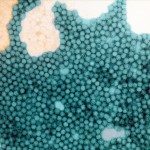Link to Pubmed [PMID] – 11763344
Dev Biol (Basel) 2001;105:99-104
Poliovirus (PV) can persist in vivo in the intestine of immunocompromised hosts for years. Moreover, immunocompetent individuals who have survived paralytic poliomyelitis sometimes develop the post-poliomyelitis syndrome (PPS), consisting of a variety of symptoms including new muscular atrophies. PPS may be due to PV persistence. We have developed models of PV persistence in neural cells and epidermoid cells. Cell determinants are of crucial importance for the establishment of persistent infections in human neuronal cells, whereas viral determinants play the primary role in human epidermoid HEp-2 cells. The results obtained with these in vitro models show the capacity of PV to persist and reveal a virus and cell co-evolution involving PV-receptor interactions. In addition, they suggest that several mechanisms are used by PV to establish and maintain persistent infections.
